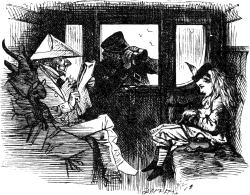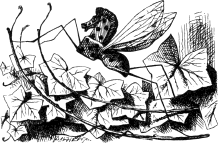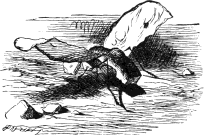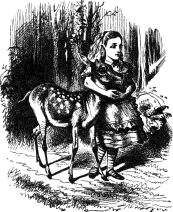Looking Glass Insects
Studies in Alice XV, by Marc Edmund Jones This lesson considers the third chapter of Through the
Looking Glass and the fifteenth great principle of
wisdom in the Philosophy of Concepts as revealed
through the adventures of Alice is that knowledge is
stimulating or that the acquisition of knowledge lies at
the beginning rather than at the close of any given
activity and is challenging rather than rewarding in its
nature. The law of growth or of evolution is conflict
and it is in and through challenging competition that
civilization has been born and has progressed to its
present point. The mere transmission of knowledge is
worthless if knowledge is not seen to be more than the facts imparted by textbooks and oral
instruction. Thus it is notable that the most ancient example of a thorough educational system is
to be found in India. In that country the antiquity of definite teaching methods is unexampled.
Moreover the intellectual subtlety developed among the early Aryans in that country is unrivaled
anywhere else in the world. But the philosophy of the East Indians was essentially non-competitive and knowledge was transmitted as absolute and beyond question and taken without
the slightest indication of critical attitude or not taken at all, and as a result the progress of
education and civilization in practically every other section of the globe has pressed so far ahead
of India as to leave that country to be viewed in recent centuries as backward and as perhaps the
world's most fertile field for missionary work and introduction to civilization. The transmission
of facts and principles theoretically is never the basis of real knowing. Knowledge creates a
necessity to do things. It is significant that with the gradual advancement of modern civilization
the aristocracy or favored classes of various lands are increasingly recruited from the fields of
intellectual or organizing achievement and that the scions of wealth are pressing out into the
world to a greater degree to make their own way rather than remaining mere beneficiaries of
transmitted advantage.
This lesson considers the third chapter of Through the
Looking Glass and the fifteenth great principle of
wisdom in the Philosophy of Concepts as revealed
through the adventures of Alice is that knowledge is
stimulating or that the acquisition of knowledge lies at
the beginning rather than at the close of any given
activity and is challenging rather than rewarding in its
nature. The law of growth or of evolution is conflict
and it is in and through challenging competition that
civilization has been born and has progressed to its
present point. The mere transmission of knowledge is
worthless if knowledge is not seen to be more than the facts imparted by textbooks and oral
instruction. Thus it is notable that the most ancient example of a thorough educational system is
to be found in India. In that country the antiquity of definite teaching methods is unexampled.
Moreover the intellectual subtlety developed among the early Aryans in that country is unrivaled
anywhere else in the world. But the philosophy of the East Indians was essentially non-competitive and knowledge was transmitted as absolute and beyond question and taken without
the slightest indication of critical attitude or not taken at all, and as a result the progress of
education and civilization in practically every other section of the globe has pressed so far ahead
of India as to leave that country to be viewed in recent centuries as backward and as perhaps the
world's most fertile field for missionary work and introduction to civilization. The transmission
of facts and principles theoretically is never the basis of real knowing. Knowledge creates a
necessity to do things. It is significant that with the gradual advancement of modern civilization
the aristocracy or favored classes of various lands are increasingly recruited from the fields of
intellectual or organizing achievement and that the scions of wealth are pressing out into the
world to a greater degree to make their own way rather than remaining mere beneficiaries of
transmitted advantage.
 Here is the principle of classification and organization.
Knowledge is found to be less the collection of facts than the
correlation or fitting together of facts. Man has become the
king of creation because of his ability to classify things or to
establish them in categories in accordance with various
organized points of view. In the Bible allegory of Genesis
this principle is seen in the description of Adam's naming
the animals or recognizing them and establishing that
recognition in a name. Nomenclature and all fundamental
agreement on terms and representations is the very basis of civilization. The symbolism of the
third chapter of Looking Glass is interesting at this point in the delightful drawing or
characterization of the woods in which all names are forgotten. As is pointed out a name must
be answered to if it is to be a name and in the magic grove there is no answering or no
responsibility and therefore no stimulation to effort because no names can be remembered. This
was the general character of the land of the Lotus-eaters. In attaining a state of perfect peace
within of a wrong sort as when responsibilities are forgotten there is an idle dream existence that
is delightful only when contrasted with some state of present unrest and fear. It is a state
actually sought by none but neurotics and subnormal individuals. Alice here has the idyllic
comradeship with the fawn until they emerge from the woods but as soon as he is removed from
the spell of forgetfulness the animal sees Alice for what she is and is off with a bound.
Forgetfulness serves a constructive purpose that can be made very useful in psychological work
by making possible a direct contact with those factors in life that will be most stimulating on any
sudden rushing return of memory.
Here is the principle of classification and organization.
Knowledge is found to be less the collection of facts than the
correlation or fitting together of facts. Man has become the
king of creation because of his ability to classify things or to
establish them in categories in accordance with various
organized points of view. In the Bible allegory of Genesis
this principle is seen in the description of Adam's naming
the animals or recognizing them and establishing that
recognition in a name. Nomenclature and all fundamental
agreement on terms and representations is the very basis of civilization. The symbolism of the
third chapter of Looking Glass is interesting at this point in the delightful drawing or
characterization of the woods in which all names are forgotten. As is pointed out a name must
be answered to if it is to be a name and in the magic grove there is no answering or no
responsibility and therefore no stimulation to effort because no names can be remembered. This
was the general character of the land of the Lotus-eaters. In attaining a state of perfect peace
within of a wrong sort as when responsibilities are forgotten there is an idle dream existence that
is delightful only when contrasted with some state of present unrest and fear. It is a state
actually sought by none but neurotics and subnormal individuals. Alice here has the idyllic
comradeship with the fawn until they emerge from the woods but as soon as he is removed from
the spell of forgetfulness the animal sees Alice for what she is and is off with a bound.
Forgetfulness serves a constructive purpose that can be made very useful in psychological work
by making possible a direct contact with those factors in life that will be most stimulating on any
sudden rushing return of memory.
 The achievement of imagination in the chapter, or the fifteenth
great scientific anticipation, is the revelation here of the
principles of a real education. This is marked in the modern
world by a new elective system that is still in the stage of trial
and experiment and the subject of much bitter controversy
when this lesson was written in 1928. In ancient times it was
well understood that whatever was forced into the being would
not stay there, and now educators are beginning to realize that
their task is more to interest students in the subject of study than to supervise the details of that
study. More and more the world of every day is coming to realize that the principle factor for
inducting the student into the consciousness of his section of country, his generation and his
stratum of life. The basis of social being is the group consciousness that the organization of
knowledge and its classification must serve fundamentally.
The achievement of imagination in the chapter, or the fifteenth
great scientific anticipation, is the revelation here of the
principles of a real education. This is marked in the modern
world by a new elective system that is still in the stage of trial
and experiment and the subject of much bitter controversy
when this lesson was written in 1928. In ancient times it was
well understood that whatever was forced into the being would
not stay there, and now educators are beginning to realize that
their task is more to interest students in the subject of study than to supervise the details of that
study. More and more the world of every day is coming to realize that the principle factor for
inducting the student into the consciousness of his section of country, his generation and his
stratum of life. The basis of social being is the group consciousness that the organization of
knowledge and its classification must serve fundamentally.
The symbolism of the inner voices in this chapter shows the Joan of Arc relationship of the group or overshadowing consciousness of life with each soul that is sensitive enough to feel the stimulating encouragement from above or more technically from within. The man dressed in white paper is recognizable to the student of symbolism as the man in linen of the Book of Daniel. As linen in the ancient world was the very finest fabric, so a real rag paper is of regal importance in the modern. This is merely the representation of the initiate higher consciousness or the visual form of that from which the voices have emanated as the outer matter or superior authority to which every aspirant must look for guidance. The thousands are a symbol of the fourth dimension, or the field of this consciousness of voices, because of the dimensional significance of all ciphers to the right of the unit in tabulation. Thus a millennium is not a period of time but a state of consciousness as suspected by all but literalists among the students of higher knowledge.
 The law of applied psychology, or the fifteenth big idea for the
solution of personal problems, is brought out here in the technique
of foundations. Permanent things must be built on rock and this is
consciousness as Jesus pointed out in his pun on the word petra.
The aspirant who refuses to be in a hurry and who thereby prevents
his consciousness from being thinned out is the one who arrives at
his goal. The tiny size of the gnat is a symbol of the initial
smallness of inspiration or is a wee small voice, but as Alice listens
the gnat becomes large and what is more survives the sudden leap
into the new square of consciousness. In the aberrant attempts to
add to the reality of things through the rocking-horse-fly and others,
the higher consciousness is weakened. Because its jokes or seeking
of inner meaning are bad or do not stimulate the gnat sighs itself away. Sadness undirected
dissipates live but poignancy or conflict in consciousness met by consciousness produces growth.
The student must learn to LIFT THE CONSCIOUSNESS of life and make a joke out of things
or must lend a forward directed and interest-awakening significance to all. When he is
depressed he must know that the depression is opportunity if he will but grasp it. He must find
The law of applied psychology, or the fifteenth big idea for the
solution of personal problems, is brought out here in the technique
of foundations. Permanent things must be built on rock and this is
consciousness as Jesus pointed out in his pun on the word petra.
The aspirant who refuses to be in a hurry and who thereby prevents
his consciousness from being thinned out is the one who arrives at
his goal. The tiny size of the gnat is a symbol of the initial
smallness of inspiration or is a wee small voice, but as Alice listens
the gnat becomes large and what is more survives the sudden leap
into the new square of consciousness. In the aberrant attempts to
add to the reality of things through the rocking-horse-fly and others,
the higher consciousness is weakened. Because its jokes or seeking
of inner meaning are bad or do not stimulate the gnat sighs itself away. Sadness undirected
dissipates live but poignancy or conflict in consciousness met by consciousness produces growth.
The student must learn to LIFT THE CONSCIOUSNESS of life and make a joke out of things
or must lend a forward directed and interest-awakening significance to all. When he is
depressed he must know that the depression is opportunity if he will but grasp it. He must find

Sabian.org





